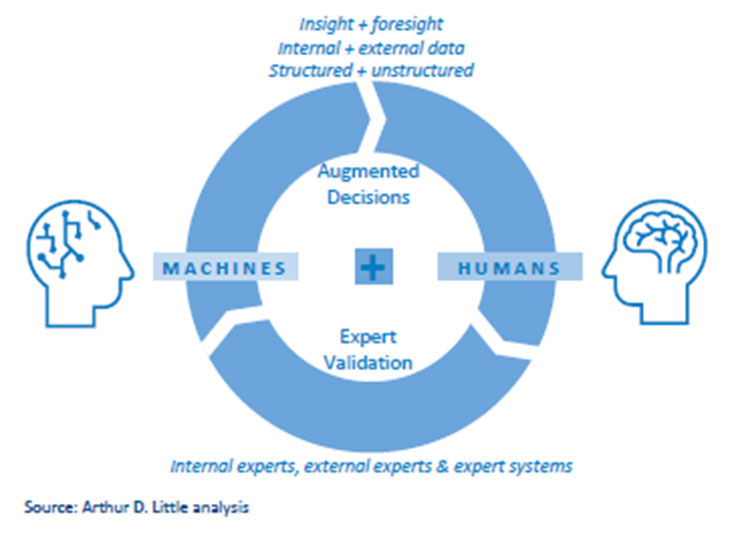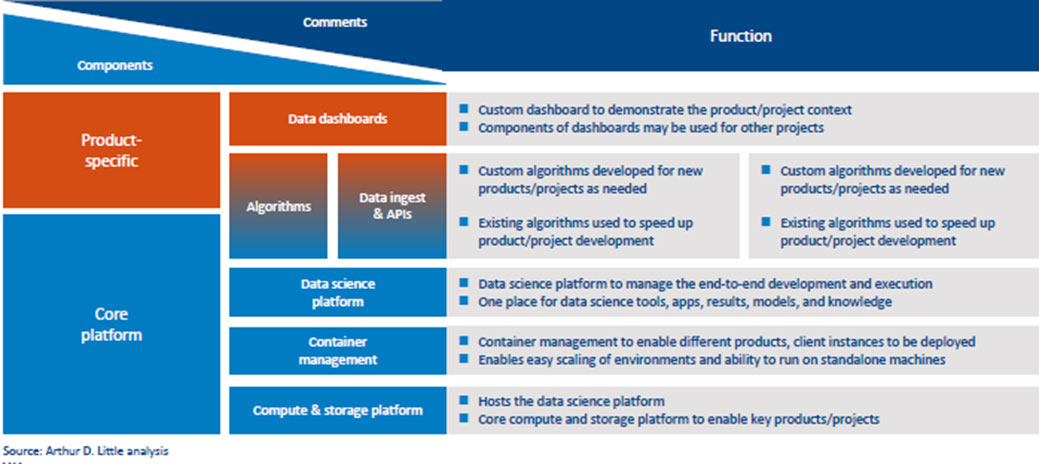Unlocking the benefits of AI by augmenting your people

For many years Artificial intelligence (AI) has been highlighted as a technology that can transform business by allowing companies to analyze much larger and more variable unstructured data sets and information, and use the results to take faster, better actions.
However, despite the hype AI applications have not yet become as common as many had predicted. A recent Arthur D. Little survey found that only 16% of AI users believe they are gaining full potential from their use of it. In many organizations, AI applications remain stuck at the pilot stage, or else are limited to specific applications such as customer interaction and intelligence. More widespread adoption of AI for key management decision making is often hindered by the lack of an adequate strategy, as well as concerns regarding loss of control, lack of transparency, and the perceived threat of job losses.
Overcoming the challenges
Organizations need to adopt a more holistic approach if they are to maximize the benefits of AI, bringing together governance, skills, frameworks and technology platforms in a single strategy.
A crucial starting point on the road to success is that AI should be used primarily to augment, rather than replace, human decision making. The human remains at the center of the process, retaining control while benefiting from superior insight based on faster analysis of a wider range of larger, more varied data sources. This allows managers to make smarter, more informed decisions faster and with greater confidence, leading to better impacts. Employing AI in this way also overcomes many of the concerns regarding its adoption. For example, ensuring there is a human in the loop minimizes fears of a loss of control, and a lack of transparency or understanding over how decisions are made.
Demonstrating the benefits of AI to augment human
Using AI to support your people delivers transformational benefits in three key areas – augmented decision making, augmented innovation and augmented innovation.
Augmented decision making enables companies to leverage good data (internal and external) and make better data-driven decisions, leading to improved outcomes. It is relevant in business contexts where human decisions involve multiple data dimensions (e.g., space, time, money, resources) and/or are very time-critical, carry intrinsic uncertainty, or are very costly.
A good example of this is predicting future commodity prices, an area where volatility and uncertainty is increasing. Companies traditionally use simple linear models for forecasting, relying solely on historical data. This often leads to failure when the market is affected by new or sudden political or economic changes, such as an unforeseen emergence of trade wars or pandemic outbreaks. By building a context-aware, continuously learning forecasting approach that consumes both structured and unstructured data (e.g., trade press articles, commodity discussion forums, and social media), a context-aware model was created for a petrochemical company that could more accurately forecast commodity prices. This allowed the company to make better decisions on hedging and adjusting production, leading to an estimated upside of over $20 million per annum.
Augmented innovation, using AI to enhance and improve innovation processes with the goal of producing novel concepts and approaches. This can both deliver breakthrough new innovations and accelerate existing work.
Take the example of a food company, creating new flavorings for customers to incorporate into their products. It aims to provide a range of options that span both low-innovation, staple products with a high potential for market success with more innovative novelty products that may have a limited sales time frame to attract consumers. New flavor creation was previously a manual process, with product developers combining elements and choosing potential options. Given the multiple elements involved in each flavoring, the range of combinations is enormous, making the selection process extremely complex. By using AI to explore all options the food company can now provide customers with a range of flavors that cover “high” market success and “high” novelty opportunities much faster. In this use case, AI augments human product developers, providing them with a narrower range of viable options to choose from.
Augmented productivity deploys AI to optimize the efficiency of assets and people. This includes using AI to suggest improvements to industrial processes to meet objectives such as reducing energy consumption, lowering waste material, improving quality, or cutting machinery downtime.
For example, producing ammonia industrially is complex, with multiple variables involved. The largest cost in the process is the electricity used. However, given the complexity of the process, optimizing energy use manually is difficult without impacting yield, resulting in cost variations of +/-15% per ton during production. By using AI modeling one chemical company was able to analyze large volumes of process data to identify optimal energy consumption. This model was then validated with fresh, unknown data before being deployed as an optimizer to support decision making within ammonia production. This provides the ability to monitor energy consumption in real time, reduced production costs by 7% thanks to lower electricity spend and maximized yield per kWh through optimized production.
Building a holistic strategy
Successfully building capabilities to augment business impacts through AI, and creating a foundation for future AI deployments, requires a holistic strategy and process. It goes far beyond simply employing data scientists and beginning a few pilot projects.
To achieve scale, companies need an approach that encompasses four key components:
All-in-one, multidisciplinary teams
The resources required to develop augmented insight capabilities span sector and technical expertise, requiring:
- Business consultants – to identify opportunities where AI will deliver tangible value.
- Solution architects – to determine how to integrate AI models into existing technology, enabling internal data to be provided systematically in the best format and in a timely manner to enable near-real-time decision making.
- Data scientists – with the ability to develop and refine the AI models and algorithms required for specific applications.
- Software engineers – to create and integrate the right technologies to build robust, business-focused applications.
These skills can sometimes be spread across an organization, hampering collaboration and slowing progress. Bridging these silos, for example by creating centers of excellence or working with relevant third-party providers, accelerates AI’s impact.
A platform approach to deliver industrialization of AI
One-off AI projects may display promising results, but often learnings are not shared, slowing momentum and meaning new projects are forced to begin from nothing. While pilot projects are a useful method of proving the business value of AI, they need to be structured so that all original IP is captured, ready to be reused in future scenarios.
Businesses should therefore adopt a project-product-platform approach:
- Project. Often an individual use case with disparate information that is not structured and not systematically available. It therefore may show value, but it is a one-time run scenario. However, success helps gain business buy-in leading to additional investment to enable productization.
- Product. Once value is seen in the pilot project, then investment should be made to productionize the approach. Often, this does not impact the AI model but strengthens the underlying technology, such as ensuring that all data sources are automatically available in near real time, enabling faster, more informed decision making.
- By ensuring that subsequent pilots/products are developed on the same platform it enables consistency and reuse of a library of existing models and data sources, and that this is embedded into the organization, underpinning all activities.
Understanding and integration of right data sources
Focusing solely on a subset of data means that decision making will not be based on the fullest possible understanding, leading to potentially inaccurate results. Augmented approaches therefore need to encompass unstructured as well as structured data, along with tacit knowledge. They should bring in relevant external data feeds, such as weather forecasts, independent economic insights, or social media, as required. Ensure that you have the right tools in place to both identify these sources and integrate them with your AI models quickly and seamlessly.
Investment in the right technologies and platform
Clearly, AI success requires a strong technology framework that uses the right components to support and deliver repeatable results. This cloud-based core technology platform should provide the capabilities that underpin all activities, from processing to data sources and models
Product-specific elements, such as algorithms, data feeds, and dashboards can then be built on top of these underlying capabilities, while still following set guidelines and formats. This speeds development and enables reuse of data science models by the entire team, avoiding any overlaps and duplication of effort.
Unlocking the power of AI in your business
Delivering AI success requires a strategic, holistic approach that retains the human at the heart of the process. Augmenting your people delivers clear benefits when it comes to decision making, innovation and productivity, while overcoming many of the concerns about AI adoption.
Thirty years ago, making use of the internet felt like a business choice, whereas now it is just as much a part of the business as the people, the product, and the general ledger. Similarly, AI will soon be a fundamental part of every successful organization, and businesses hoping to thrive need to be ready.
Written by Michaël Kolk, Managing Partner, Technology & Innovation Management Practice; Michael Eiden, Associate Director, Technology & Innovation Management Practice; Nicholas Johnson, Partner, Technology & Innovation Management Practice; and Oliver Turnbull, Principal, Technology & Innovation Management Practice at Arthur D. Little.
Also read articles by Arthur D. Little’s Opinion columnists at the CEOWORLD magazine: Rick Eagar, Etienne Brumauld Des Houlières, Alan Martinovich, Phil Webster, Thomas Unger, Gregory Pankert, Michaël Kolk.
Have you read?
# Best CEOs In the World Of 2022.
# TOP Citizenship by Investment Programs, 2022.
# Top Residence by Investment Programs, 2022.
# Global Passport Ranking, 2022.
# The World’s Richest People (Top 100 Billionaires, 2022).
Bring the best of the CEOWORLD magazine's global journalism to audiences in the United States and around the world. - Add CEOWORLD magazine to your Google News feed.
Follow CEOWORLD magazine headlines on: Google News, LinkedIn, Twitter, and Facebook.
Copyright 2025 The CEOWORLD magazine. All rights reserved. This material (and any extract from it) must not be copied, redistributed or placed on any website, without CEOWORLD magazine' prior written consent. For media queries, please contact: info@ceoworld.biz










